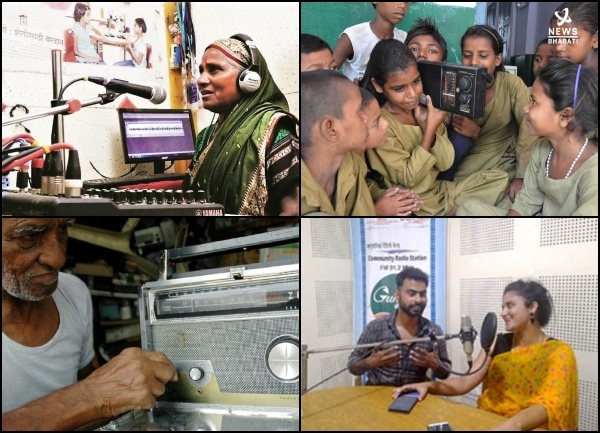Community Radio: For the People, By the People, With the People
Community radio has a wide range of uses, from promoting social development and education to supporting emergency response and disaster recovery.
Total Views | 238
In 1894, the young Italian inventor Marconi began working on the idea of building long-distance a wireless transmission systems based on the use of Hertzian waves (radio waves), he perhaps was not aware of a revolutionary mass communication tool was in making for the entire world. Later in the year 1901, when the letter ‘S’ was received after two years of transmission over Atlantic, history was made.
Today is World Radio Day which is observed to recognize the role and importance of radio in providing information, promoting freedom of expression, and supporting cultural diversity.

Radio has been a powerful communication tool, particularly in areas where access to other forms of media is limited. Radio programs can be broadcast over long distances, and are relatively inexpensive to produce, making it an effective way to reach people in remote and low-income areas. In addition, radio has the ability to transcend language barriers and reach diverse audiences, providing a platform for voices that might otherwise go unheard.
UNESCO declared 'Radio and Peace' as the theme for World Radio Day 2023. The theme for World Radio Day 2022 was "New World, New Radio" which highlighted the resilience and innovation of radio during the COVID-19 pandemic.
Radio emerged as a tool of mass media from the very early days of its introduction until today.
Despite the rise of new technologies, ‘Good Old Radio’ as they say, remains an important and durable medium for mass communication and information sharing. On World Radio Day, we celebrate the vital role that radio plays in connecting people, promoting dialogue and understanding, and fostering a more informed and equitable world.
Community Radio generally is managed by various types of non-profit social organizations with a fundamental characteristic of a participative approach to the community right from ownership to programming, management, operation, financing, evaluation, and overall implementation. They are independent and non-governmental media that do not depend on or are part of political parties or private firms.
Community radio plays an important role in social development, particularly in areas where mainstream media does not adequately represent the interests and concerns of local communities. Community radio stations are typically run and managed by members of the community, and are often focused on issues that are directly relevant to their audience.
One of the key benefits of community radio is its ability to promote dialogue and foster greater social cohesion. By providing a platform for diverse voices and opinions, community radio stations can help to bridge divides and build stronger relationships between different groups. Community radio can also provide a space for marginalized and underrepresented communities to share their stories and perspectives, helping to amplify their voices and promote social justice.
Community radio can also play an important role in the promotion of education, skilling and awareness on a range of social issues such as health and safety, agriculture, weather & environmental sustainability, etc.
In addition, community radio can be used as a tool for community mobilization and advocacy. By highlighting local concerns and advocating for change, community radio stations can help to build support for social development initiatives and drive positive social change.
Community radio has a wide range of uses, from promoting social development and education to supporting emergency response and disaster recovery. Some of the key uses of community radio which can be envisaged are:
1. PROMOTING SOCIAL DEVELOPMENT: Community radio can be used to promote social development by providing a platform for diverse voices and opinions, and by focusing on issues that are directly relevant to the local community. This can help to promote social justice, build stronger relationships between different groups, and foster greater social cohesion.
2. SUPPORTING EDUCATION & SKILLING: Community radio can be used to support lifelong learning by providing educational programming on a range of topics, including health, hygiene, agriculture, entrepreneurship, skill development and vocational training etc. By providing accessible and engaging educational resources, community radio stations can help to promote literacy and language development and support social and economic development.
3. FOSTERING COMMUNITY ENGAGEMENT: Community radio can be used to foster community engagement by providing a platform for local events, news, and cultural activities. This can help to build a sense of community identity and promote greater social interaction and engagement.
4. SUPPORTING EMERGENCY RESPONSE AND DISASTER RECOVERY: Community radio can be used to support emergency response and disaster recovery efforts by providing up-to-date information on the situation, coordinating relief efforts, and mobilizing volunteers.
5. PROVIDING A PLATFORM FOR MARGINALIZED VOICES FOR LIFE SKILLS: Community radio can be used a platform for marginalized and underrepresented communities, including women, ethnic and linguistic minorities, and people with disabilities towards life-skills programme and promote greater social equity and support a more just and inclusive society.
Use of Community Radio as an Educational Tool
One of the key benefits of community radio as an educational tool is its ability to reach diverse audiences, including those who may not have access to traditional forms of education. Community radio stations can provide information on a range of topics, from health and hygiene to agricultural practices, and can do so in a way that is accessible and engaging for listeners.
In addition, community radio can be used to promote literacy and language development. By broadcasting educational programming in local languages, community radio stations can help to promote language development and literacy, particularly among children and young people.
Community radio can also be used to support adult education and training, by providing resources and information on vocational training, entrepreneurship, and other skills that can support economic development. This can be particularly important in areas where formal education opportunities are limited or where there is high unemployment or underemployment.
Overall, community radio can be a powerful educational tool, helping to support lifelong learning, promote language and literacy development, and support social and economic development. By providing access to information and resources on a range of topics, community radio stations can help to promote a more informed and equitable world.
Community Radio In Disasters
Community radio can play an important role in disaster response and recovery, providing a critical communication lifeline for communities affected by natural disasters, emergencies, and other crises.
Radio-based information systems have been used as a Public service during Tsunami and other disasters. During a disaster, community radio stations can provide up-to-date information on the situation, including information on evacuation orders, shelter locations, and emergency services. By providing this information in real-time, community radio stations can help to keep communities informed and safe, and can help to reduce panic and confusion.
Community radio stations can also provide a platform for affected communities to share their stories and experiences and to connect with others who may be going through similar experiences. By providing a space for people to share their concerns and fears, community radio stations can help to promote social cohesion and provide emotional support for those affected by a disaster.
In addition, community radio stations can be used to coordinate disaster response efforts, by sharing information on relief efforts, mobilizing volunteers, and coordinating the delivery of aid and supplies. This can be particularly important in areas where access to communication infrastructure may be limited or disrupted. By working to build strong and resilient communication networks, community radio stations can help to promote greater safety, security, and preparedness in the face of disaster.
Despite the important role that community radio plays in promoting social development, there are a number of challenges that these stations can face. One of the biggest challenges is funding, as community radio stations often have limited resources and may struggle to secure sustainable funding sources. This can make it difficult for stations to invest in equipment, training, and programming, and can limit their ability to reach and engage their audiences.
Technical challenges can also be a barrier for community radio stations, particularly in areas with limited infrastructure or where access to electricity or the internet is limited. This can make it difficult for stations to broadcast and reach their audiences, and may limit their ability to produce high-quality programming.
Despite these challenges, community radio stations continue to play an important role in promoting social development and fostering greater social equity. By addressing these challenges and working to build strong, sustainable, and engaged communities, community radio stations can continue to make a positive impact on the lives of people around the world.
By providing a platform for diverse voices and perspectives, community radio stations can help to build stronger, more connected communities and promote a more just and equitable world.
Today is World Radio Day which is observed to recognize the role and importance of radio in providing information, promoting freedom of expression, and supporting cultural diversity.

Radio has been a powerful communication tool, particularly in areas where access to other forms of media is limited. Radio programs can be broadcast over long distances, and are relatively inexpensive to produce, making it an effective way to reach people in remote and low-income areas. In addition, radio has the ability to transcend language barriers and reach diverse audiences, providing a platform for voices that might otherwise go unheard.
UNESCO declared 'Radio and Peace' as the theme for World Radio Day 2023. The theme for World Radio Day 2022 was "New World, New Radio" which highlighted the resilience and innovation of radio during the COVID-19 pandemic.
Radio emerged as a tool of mass media from the very early days of its introduction until today.
Despite the rise of new technologies, ‘Good Old Radio’ as they say, remains an important and durable medium for mass communication and information sharing. On World Radio Day, we celebrate the vital role that radio plays in connecting people, promoting dialogue and understanding, and fostering a more informed and equitable world.
Community Radio generally is managed by various types of non-profit social organizations with a fundamental characteristic of a participative approach to the community right from ownership to programming, management, operation, financing, evaluation, and overall implementation. They are independent and non-governmental media that do not depend on or are part of political parties or private firms.
Community radio plays an important role in social development, particularly in areas where mainstream media does not adequately represent the interests and concerns of local communities. Community radio stations are typically run and managed by members of the community, and are often focused on issues that are directly relevant to their audience.
One of the key benefits of community radio is its ability to promote dialogue and foster greater social cohesion. By providing a platform for diverse voices and opinions, community radio stations can help to bridge divides and build stronger relationships between different groups. Community radio can also provide a space for marginalized and underrepresented communities to share their stories and perspectives, helping to amplify their voices and promote social justice.
Community radio can also play an important role in the promotion of education, skilling and awareness on a range of social issues such as health and safety, agriculture, weather & environmental sustainability, etc.
In addition, community radio can be used as a tool for community mobilization and advocacy. By highlighting local concerns and advocating for change, community radio stations can help to build support for social development initiatives and drive positive social change.
Community radio has a wide range of uses, from promoting social development and education to supporting emergency response and disaster recovery. Some of the key uses of community radio which can be envisaged are:
1. PROMOTING SOCIAL DEVELOPMENT: Community radio can be used to promote social development by providing a platform for diverse voices and opinions, and by focusing on issues that are directly relevant to the local community. This can help to promote social justice, build stronger relationships between different groups, and foster greater social cohesion.
2. SUPPORTING EDUCATION & SKILLING: Community radio can be used to support lifelong learning by providing educational programming on a range of topics, including health, hygiene, agriculture, entrepreneurship, skill development and vocational training etc. By providing accessible and engaging educational resources, community radio stations can help to promote literacy and language development and support social and economic development.
3. FOSTERING COMMUNITY ENGAGEMENT: Community radio can be used to foster community engagement by providing a platform for local events, news, and cultural activities. This can help to build a sense of community identity and promote greater social interaction and engagement.
4. SUPPORTING EMERGENCY RESPONSE AND DISASTER RECOVERY: Community radio can be used to support emergency response and disaster recovery efforts by providing up-to-date information on the situation, coordinating relief efforts, and mobilizing volunteers.
5. PROVIDING A PLATFORM FOR MARGINALIZED VOICES FOR LIFE SKILLS: Community radio can be used a platform for marginalized and underrepresented communities, including women, ethnic and linguistic minorities, and people with disabilities towards life-skills programme and promote greater social equity and support a more just and inclusive society.
Use of Community Radio as an Educational Tool
One of the key benefits of community radio as an educational tool is its ability to reach diverse audiences, including those who may not have access to traditional forms of education. Community radio stations can provide information on a range of topics, from health and hygiene to agricultural practices, and can do so in a way that is accessible and engaging for listeners.
In addition, community radio can be used to promote literacy and language development. By broadcasting educational programming in local languages, community radio stations can help to promote language development and literacy, particularly among children and young people.
Community radio can also be used to support adult education and training, by providing resources and information on vocational training, entrepreneurship, and other skills that can support economic development. This can be particularly important in areas where formal education opportunities are limited or where there is high unemployment or underemployment.
Overall, community radio can be a powerful educational tool, helping to support lifelong learning, promote language and literacy development, and support social and economic development. By providing access to information and resources on a range of topics, community radio stations can help to promote a more informed and equitable world.
Community Radio In Disasters
Community radio can play an important role in disaster response and recovery, providing a critical communication lifeline for communities affected by natural disasters, emergencies, and other crises.
Radio-based information systems have been used as a Public service during Tsunami and other disasters. During a disaster, community radio stations can provide up-to-date information on the situation, including information on evacuation orders, shelter locations, and emergency services. By providing this information in real-time, community radio stations can help to keep communities informed and safe, and can help to reduce panic and confusion.
Community radio stations can also provide a platform for affected communities to share their stories and experiences and to connect with others who may be going through similar experiences. By providing a space for people to share their concerns and fears, community radio stations can help to promote social cohesion and provide emotional support for those affected by a disaster.
In addition, community radio stations can be used to coordinate disaster response efforts, by sharing information on relief efforts, mobilizing volunteers, and coordinating the delivery of aid and supplies. This can be particularly important in areas where access to communication infrastructure may be limited or disrupted. By working to build strong and resilient communication networks, community radio stations can help to promote greater safety, security, and preparedness in the face of disaster.
Despite the important role that community radio plays in promoting social development, there are a number of challenges that these stations can face. One of the biggest challenges is funding, as community radio stations often have limited resources and may struggle to secure sustainable funding sources. This can make it difficult for stations to invest in equipment, training, and programming, and can limit their ability to reach and engage their audiences.
Technical challenges can also be a barrier for community radio stations, particularly in areas with limited infrastructure or where access to electricity or the internet is limited. This can make it difficult for stations to broadcast and reach their audiences, and may limit their ability to produce high-quality programming.
Despite these challenges, community radio stations continue to play an important role in promoting social development and fostering greater social equity. By addressing these challenges and working to build strong, sustainable, and engaged communities, community radio stations can continue to make a positive impact on the lives of people around the world.
By providing a platform for diverse voices and perspectives, community radio stations can help to build stronger, more connected communities and promote a more just and equitable world.
Bharati Web








